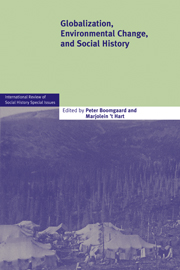Book contents
- Frontmatter
- Contents
- Notes on Contributors
- Globalization, Environmental Change, and Social History: An Introduction
- The El Dorado of Forestry: The Eucalyptus in India, South Africa, and Thailand, 1850–2000
- The Mid-Atlantic Islands: A Theatre of Early Modern Ecocide?
- Environmental Change and Globalization in Seventeenth-Century France: Dutch Traders and the Draining of French Wetlands (Arles, Petit Poitou)
- The Colonial Famine Plot: Slavery, Free Trade, and Empire in the French Atlantic, 1763–1791
- Environmental Changes, the Emergence of a Fuel Market, and the Working Conditions of Salt Makers in Bengal, c. 1780–1845
- Industrial Life in a Limiting Landscape: An Environmental Interpretation of Stalinist Social Conditions in the Far North
- “Pumpkins Just Got in There”: Gender and Generational Conflict and “Improved” Agriculture in Colonial Zimbabwe
- Hydro-businesses: National and Global Demands on the São Francisco River Basin Environment of Brazil
- Bibliography
Environmental Change and Globalization in Seventeenth-Century France: Dutch Traders and the Draining of French Wetlands (Arles, Petit Poitou)
Published online by Cambridge University Press: 05 June 2012
- Frontmatter
- Contents
- Notes on Contributors
- Globalization, Environmental Change, and Social History: An Introduction
- The El Dorado of Forestry: The Eucalyptus in India, South Africa, and Thailand, 1850–2000
- The Mid-Atlantic Islands: A Theatre of Early Modern Ecocide?
- Environmental Change and Globalization in Seventeenth-Century France: Dutch Traders and the Draining of French Wetlands (Arles, Petit Poitou)
- The Colonial Famine Plot: Slavery, Free Trade, and Empire in the French Atlantic, 1763–1791
- Environmental Changes, the Emergence of a Fuel Market, and the Working Conditions of Salt Makers in Bengal, c. 1780–1845
- Industrial Life in a Limiting Landscape: An Environmental Interpretation of Stalinist Social Conditions in the Far North
- “Pumpkins Just Got in There”: Gender and Generational Conflict and “Improved” Agriculture in Colonial Zimbabwe
- Hydro-businesses: National and Global Demands on the São Francisco River Basin Environment of Brazil
- Bibliography
Summary
Summary: Between 1599 and the end of the 1650s, the French Crown sustained a policy of land reclamation at a large scale. It was led by the French aristocracy who were helped by representatives of the merchant elites of Amsterdam, such as Hieronimus van Uffelen and Jean Hoeufft. The works in both Arles (Provence) and Petit Poitou (Poitou) show that land reclamation involved a radical change in society, reinforced the authority of the Crown in the areas concerned, and disrupted the former social balances built around the marshes. Thus, land reclamation aroused several conflicts which revealed its deep impact on the environment. So, this article demonstrates how the making of the modern state, backed by the development of European trade and banking, caused ecological and social changes by connecting the political and financial powers on a European scale.
In the long-term history of wetlands, the sixteenth century represents a turning point as at that time very large funds were injected into a new system of drainage. In the Low Countries and in northern Italy more than anywhere else, the conquest of the wetlands turned into an extensive business.
The change was particularly marked in Holland, where people were obliged to manage the consequences of the intensive mining of peat which had occurred during the Middle Ages. To drain the lakes created by the resulting subsidence, the Dutch employed new techniques, using wind-mills to divert water into canals and rivers.
- Type
- Chapter
- Information
- Globalization, Environmental Change, and Social History , pp. 79 - 102Publisher: Cambridge University PressPrint publication year: 2011

